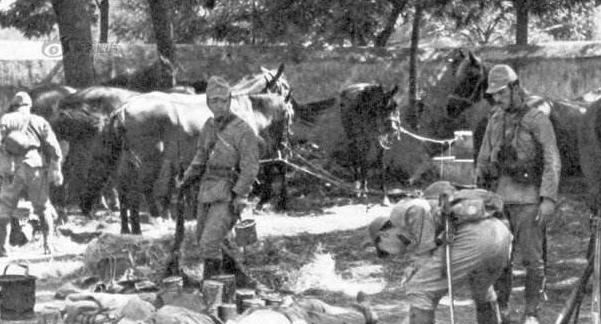The Japanese successfully cut off the first chain on China's already fragile coastal defense line, Tianjin, and they set the second target in Shanghai. Japan has coveted Shanghai for a long time, and they know what the occupation of Shanghai means to them. Located at the midpoint of China's coastline and facing the Pacific Ocean, Shanghai is not only China's economic center, but also a world-famous international trade port. More importantly, Shanghai is also the gateway to Nanjing, the capital of the Nationalist government, the political center of China.

After the July 7 Incident, the Japanese government ordered the Navy to prepare for all-out war. On July 11, Vice Admiral Kiyoshi Hasegawa, commander of the 3rd Fleet of the Japanese Navy in China, arrived in Shanghai on the flagship Izumo. On July 16, Hasegawa Kiyoshi submitted to Tokyo the "Opinions on the Use of Troops in Combat against China", proposing that "'China is to be put to death in order to control The most important thing in Shanghai and Nanjing", and advocated sending five divisions from the mainland to capture Shanghai and directly take Nanjing, the heart of the Nationalist government. On August 10, the Japanese Navy ordered 25 warships of various types on standby in Sasebo to sail to Shanghai at full speed.
Soon, more than 30 warships of the Japanese 1st and 3rd Fleets were clustered in the Huangpu River and the ports below the Liu River in the lower reaches of the Yangtze River, looking at the bustling crowds of Shanghai. After Pingjin was quickly occupied by the Japanese army, for a while, the pessimistic theory that China's War of Resistance would be defeated was rampant in society. Among them, the data on the balance of power between China and Japan is most often cited. Some people have compared the military strength of China and Japan, pointing out that the tonnage of Japanese naval vessels is more than 1.9 million tons, and China's 110,000 tons, which is less than one-tenth of Japan's; the Japanese Air Force has more than 2,700 combat aircraft, and China has only 305.
Once compared, the conclusion is that once China and Japan go to war, the Chinese army will not be vulnerable at all. Even some military sources have said that China's sea lines of communication will inevitably be cut off by Japan, and China's coastal defense will be useless. If the Japanese wanted to capture Shanghai, they could immediately blockade the Chinese coastline with a few warships. From Shantou, Xiamen, Fuzhou, Ningbo, Shanghai, Yantai, and all the way to Guangzhou and Hong Kong, Japan only needed to send part of its naval forces to occupy all the economic centers along China's coast, forcing China to tie its hands.
Even Hu Shi, a friend of Chiang Kai-shek's slanderous and cultural figure, advocated avoiding war and negotiating peace with Japan. Hu Shi believed that with the huge gap in strength between China and Japan at that time, if they met with Japanese soldiers, it would be tantamount to hitting a stone with a pebble. These popular news in society soon reached Chiang Kai-shek's ears, and Chiang Kai-shek knew very well that he could speak passionately and with pride and ambition. But since ancient times, there has never been a war that has been won by lip service. The Nanjing government's control over China at that time was already very limited, and the gap in strength between the Chinese and Japanese armies was very obvious.